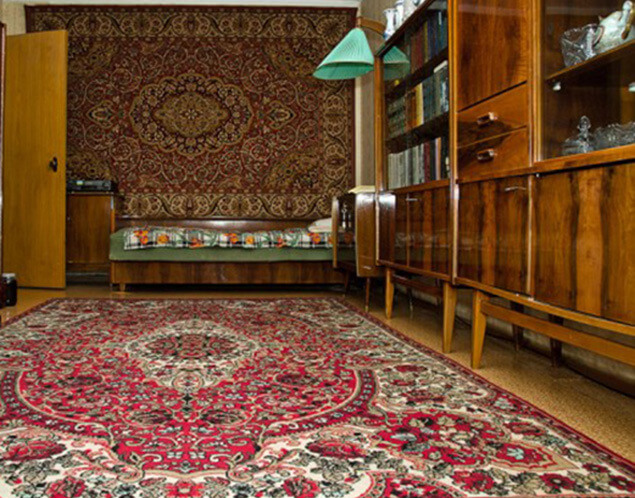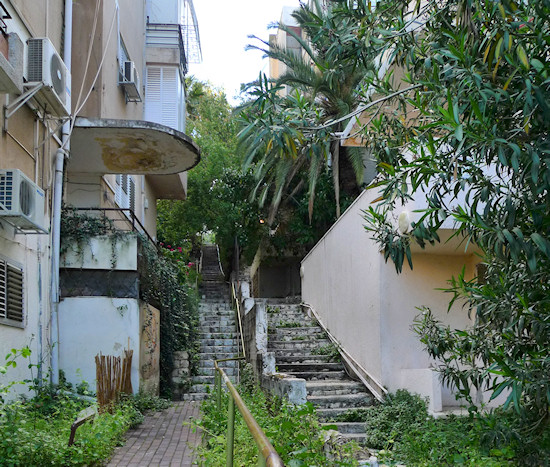I've recently encountered
an article on the BBC website (which I never visit, I have no idea how I got there) about "Third Culture Kids" - a term coined by a US sociologist Ruth Hill Useem in the 50s (never heard about her either, not even at uni) to describe children who "spend their formative years in places that are not their parents' home land". The term also applies for children who lived in different countries during their childhood.
I study Social Sciences and we discussed about child education and development in the first semesters. In Germany you would be a "second generation child" if you're born in Germany but your parents weren't.
TCK does describe my socialization pretty well, as I grew up in Israel from the age of 6 after my parents immigrated there from Russia*. Their Soviet Union socialization and background has been ever so present at home and like many millennials with a Russian background living in western countries - I carry an unexplainable baggage of post-Soviet Union Russian upbringing that translates into my values, traditions and language (among many other things). After the age of 6 things turned around though, as the Israeli culture and mentality was drastically different.
*(yes I am originally from Uzbekistan but my parents lived in Moscow for a year before moving to Israel)
The mentioned article described the advantages and disadvantages of children growing up in different countries. As an advantage you get the "multiple language & culture" package installed in your brain whether you like it or not, and that is for some a huge privilege, and one that I'm aware of. On the other hand, TCK children might feel detached from friends and family members, making them unable to contain prolonged friendships in the age where contact to peers starts to be very relevant, thus being burdened with loneliness.
This all might sound like a fair arrangement, and while reading the article I found myself remembering many cross cultural moments that weren't mentioned that I would like to share.
 |
Source.
A postcard of probably the most iconic Russian children's show. I used to have this postcard as a kid! |
1. Culture A vs. Culture B
There were special schools for TCK mentioned in the article, where all traveling parents' children can come together and experience the cultures of their home. Well, this isn't really the case for immigrant children in Israel (aside from receiving help for learning the language of course), and after I came to Israel and devoured the new language and culture whole - somewhere in the middle of elementary school I realized there's a disparity between how things look like at home and outside.
As I grew a bit older and could judge social situations better I noticed that the words and termini we used in school were not familiar to my parents. My mother, while trying her best to help my poor brain with math homework, had difficulty calling all the math functions with their Hebrew names, and called them in Russian the way she learned them. This confused me, especially when my mom praised Russian schools and their better way of teaching mathematics. How could you teach otherwise? The way we were having it couldn't be more complicated! (when it came to math - I was a lost cause).
Soon snippets of "the culture back there" (Russian - for my parents) tied in with "the culture here" (Israel - the here and now for me) and with it began the never ending journey of comparisons - Russian vs Israeli culture, home vs school/outside, old vs new...
We also watched only Russian television during our first years in Israel, which created an exciting double reality for life at home and life outside. The nr. 1 rule at home was -
we speak RUSSIAN here. You might think that keeping the "new" Israeli culture out the door was confusing and
unfair for a child, but let me tell you - my mom went through hell and back to keep my mother language alive and kicking, since she believed the most
unfair thing would be depriving me of it. Well, she was right.
Just to quickly disclaim here - my parents have integrated in Israel very well and accepted this new life with open arms (it was their choice to come there after all!). They in fact see themselves as Israelis and enjoy life in Israel immensely. The acclimatization didn't come immediately though, and that's made all the difference!
 |
Source.
Typical Soviet Union apartment. Our apartments in Israel luckily never looked like this, but the atmosphere lingered. |
2. Far Away Relatives
While my father's entire family lived in our city, all my mother's side was left in Uzbekistan. As a very young and already quite angsty teenager, I didn't see my father's relatives as my own, since he technically is my "step" father. So for many years, the "true" family in my head were the ones far away, somewhere in the east between the dusty mountains of a land no one of my friends could ever relate to and locate on the map. My grandparents were "somewhere out there"...*
I looked at old pictures of my early childhood in Tashkent and thought about how my "real" family was doing. I heard about weekly visits to grandparents about my classmates - a reality that was not mine. It is still a sad thought for me, not being able to grow up near my mother's side of the family - a life my mother chose herself, which not being near her own mother was hard for her, especially in recent years as my grandparents get older.
*After a few years post-immigration my parents could afford flying to Uzbekistan, and even then my father couldn't join us. In later years visits became more frequent.
It hurts me to realize that this destiny is likely to befall my child(ren) as well, as I have no intentions of coming back to Israel but rather wish to always go forward. In the worst case - on we go to the next country. But on that later on!
Not having my entire family tree in one country depressed me as a kid. In middle school we had to do a huge assignment on our family and roots, which I did involuntarily. I didn't want to talk about my family, because I couldn't really place their existence in my own head. I felt disconnected from other classmates and their stories - kids who's great grandparents have built Israel from scratch after WW2 and other heroic tales of past generations being directly involved in the country I felt little to no relation to. My great grandfather has fought in WW2 alright, but for the Soviet Union; he went back to Ukrane from Germany by foot. I felt like the biography of my family wasn't really taken into account, and many regarded my culture with stereotypes they saw on TV about the "crazy Russian people" and how they differ from the Israeli mentality. I felt people noticed the differences more than what brought all of us in this salad of a country together.
One classmate (who was from Kazakhstan btw!) didn't do the family tree assignment at all, and I could understand him.
 |
Source.
A shot from Hadar, one of the oldest neighborhoods in Haifa, Israel. Boris and mine's first apartment was in that neighborhood. |
3. Israeli-Russian Kids Unite!
Luckily, I wasn't the only kid in school experiencing all the above, and even my elementary school class consisted 90% of Russian immigrant kids. We had it all the same - families struggling financially and /or with the language, scattered relatives, Russian accent while speaking Hebrew and my personal favorite - Hebrew replacing Russian as a second mother language. We would talk in Hebrew at school all day, so of course we spoke it between each other!
Russian was the "leave it at home" language now, as all the real fun was being had outside! Hebrew slang ran in our veins and the first question you would ask a new Russian-Israeli friend would be "where are you from?". The neighborhood where I grew up was heavily populated with Soviet Union immigrants, and all of our parents have stuck together too.
It was only when I began middle school and later in high school that I got to experience other (perhaps more representative) Israeli kids, and realized that I was not only culturally different, but also financially. Since going to an arts inclined middle and high school, almost the entire school consisted of kids of well settled, long-timed Israelis who had money to put their children in front of a piano (with a Russian piano teacher, no less!!) to make them proud. My mom put me behind the recorder after she found me a teacher, as she wanted me more than ever to study music like she did. And after it turned out that my ability in music ate my ability in math (and many other subjects) for breakfast, I was encouraged to never get that heavily underestimated and underappreciated baroque wind instrument out of my mouth! When it came to me and my recorder, money was never the question.
4. A Child of the World?
I often heard the expression "a person of the world" and aside from cheesy hippie connotations I have to admit it makes a lot of sense. Yet I think I have elaborated enough on my own experiences, so to give this post a proper closure I will ponder a little on the consequences of all the above on my future child.
I do intend having a child one day. Regardless of it not happening anytime soon, I like to think of the idea that all those multi cultural experiences and adventures will inevitably manifest in my own upbringing as a parent. I will ruthlessly continue my mother's policy and teach my child some Russian, because how the hell will he/she communicate with their grandparents anyway? Yet I acknowledge that the atmosphere at home will never be strictly Russian, or strictly Israeli for that matter. My greatest wish is for my child to know where their ancestors come from, and why he/she are experiencing the specific culture at home. It excites me to think of this and with so many relatives all across the world I have no doubt my child will have their fair share of traveling, languages and exploration.
Have you been affected by different cultures? What kind of environment would you wish for your children, if you'd have any? Could you imagine growing up differently?
Hope you liked this post!
Maria

















